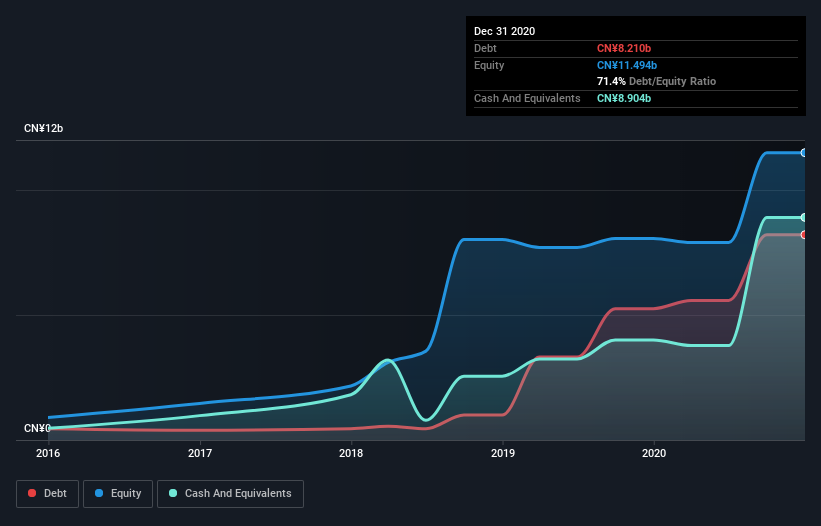- Hong Kong
- /
- Real Estate
- /
- SEHK:2048
E-House (China) Enterprise Holdings (HKG:2048) Has A Somewhat Strained Balance Sheet
Warren Buffett famously said, 'Volatility is far from synonymous with risk.' When we think about how risky a company is, we always like to look at its use of debt, since debt overload can lead to ruin. We can see that E-House (China) Enterprise Holdings Limited (HKG:2048) does use debt in its business. But the more important question is: how much risk is that debt creating?
When Is Debt A Problem?
Generally speaking, debt only becomes a real problem when a company can't easily pay it off, either by raising capital or with its own cash flow. Part and parcel of capitalism is the process of 'creative destruction' where failed businesses are mercilessly liquidated by their bankers. While that is not too common, we often do see indebted companies permanently diluting shareholders because lenders force them to raise capital at a distressed price. Of course, debt can be an important tool in businesses, particularly capital heavy businesses. The first thing to do when considering how much debt a business uses is to look at its cash and debt together.
Check out our latest analysis for E-House (China) Enterprise Holdings
How Much Debt Does E-House (China) Enterprise Holdings Carry?
You can click the graphic below for the historical numbers, but it shows that as of December 2020 E-House (China) Enterprise Holdings had CN¥8.21b of debt, an increase on CN¥5.25b, over one year. But on the other hand it also has CN¥8.90b in cash, leading to a CN¥694.2m net cash position.

How Healthy Is E-House (China) Enterprise Holdings' Balance Sheet?
According to the last reported balance sheet, E-House (China) Enterprise Holdings had liabilities of CN¥9.23b due within 12 months, and liabilities of CN¥5.05b due beyond 12 months. Offsetting this, it had CN¥8.90b in cash and CN¥10.7b in receivables that were due within 12 months. So it actually has CN¥5.28b more liquid assets than total liabilities.
This excess liquidity is a great indication that E-House (China) Enterprise Holdings' balance sheet is almost as strong as Fort Knox. With this in mind one could posit that its balance sheet means the company is able to handle some adversity. Simply put, the fact that E-House (China) Enterprise Holdings has more cash than debt is arguably a good indication that it can manage its debt safely.
Shareholders should be aware that E-House (China) Enterprise Holdings's EBIT was down 21% last year. If that earnings trend continues then paying off its debt will be about as easy as herding cats on to a roller coaster. There's no doubt that we learn most about debt from the balance sheet. But ultimately the future profitability of the business will decide if E-House (China) Enterprise Holdings can strengthen its balance sheet over time. So if you're focused on the future you can check out this free report showing analyst profit forecasts.
But our final consideration is also important, because a company cannot pay debt with paper profits; it needs cold hard cash. While E-House (China) Enterprise Holdings has net cash on its balance sheet, it's still worth taking a look at its ability to convert earnings before interest and tax (EBIT) to free cash flow, to help us understand how quickly it is building (or eroding) that cash balance. During the last three years, E-House (China) Enterprise Holdings burned a lot of cash. While that may be a result of expenditure for growth, it does make the debt far more risky.
Summing up
While we empathize with investors who find debt concerning, you should keep in mind that E-House (China) Enterprise Holdings has net cash of CN¥694.2m, as well as more liquid assets than liabilities. So although we see some areas for improvement, we're not too worried about E-House (China) Enterprise Holdings's balance sheet. There's no doubt that we learn most about debt from the balance sheet. However, not all investment risk resides within the balance sheet - far from it. These risks can be hard to spot. Every company has them, and we've spotted 3 warning signs for E-House (China) Enterprise Holdings (of which 1 is a bit concerning!) you should know about.
At the end of the day, it's often better to focus on companies that are free from net debt. You can access our special list of such companies (all with a track record of profit growth). It's free.
If you’re looking to trade a wide range of investments, open an account with the lowest-cost* platform trusted by professionals, Interactive Brokers. Their clients from over 200 countries and territories trade stocks, options, futures, forex, bonds and funds worldwide from a single integrated account. Promoted
Valuation is complex, but we're here to simplify it.
Discover if E-House (China) Enterprise Holdings might be undervalued or overvalued with our detailed analysis, featuring fair value estimates, potential risks, dividends, insider trades, and its financial condition.
Access Free AnalysisThis article by Simply Wall St is general in nature. It does not constitute a recommendation to buy or sell any stock, and does not take account of your objectives, or your financial situation. We aim to bring you long-term focused analysis driven by fundamental data. Note that our analysis may not factor in the latest price-sensitive company announcements or qualitative material. Simply Wall St has no position in any stocks mentioned.
*Interactive Brokers Rated Lowest Cost Broker by StockBrokers.com Annual Online Review 2020
Have feedback on this article? Concerned about the content? Get in touch with us directly. Alternatively, email editorial-team (at) simplywallst.com.
About SEHK:2048
E-House (China) Enterprise Holdings
An investment holding company, provides real estate transaction services in China.
Slightly overvalued with very low risk.
Market Insights
Community Narratives



